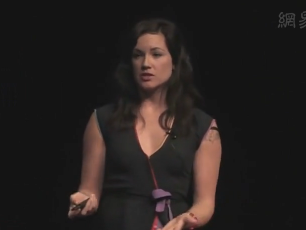Now, like I said, I'm a big fan of technology.
正如我所說的,我是個大科技迷。
Obviously, I use technology every day; I'm a scientist.
作為一個科學家,顯然每天我都使用高科技。
And there's this tendency to say that it's progress that -- you know, I'm not suggesting we're going to all go live by candlelight.
大家傾向于認為這是進步--我并非建議大家在燭光下生活。
Indeed, technology is allowing us to access the sky in ways that are impossible otherwise.
確實,科技使我們能夠接近天空。
One of the greatest examples of this is, of course, the Hubble Space Telescope.
用一種只有科技能夠做到的方式,當然,最偉大的例子就是哈勃太空望遠鏡。
The Hubble went up into space, it returns pictures daily,
哈勃望遠鏡被發射進入太空,每天都傳回大量照片,
and it allows us to see things that we are incapable of seeing with our naked eye,
讓我們看到太空的事物,這些都是我們肉眼所看不到的,
in ways that we've never been able to do before in all of human history.
在人類歷史的任何階段,我們都從沒這么做過。
Other examples of this would be planetarium shows.
其它類似的例子當然還有天體展示。

In the past couple of years, planetarium shows have become more high-tech with these great visualizations,
在過去的幾年里,借助這些超棒的可視化信息,天體展示變得越來越高科技化,
and even though this isn't access directly to the sky, it's at least access to our knowledge about the sky.
即使這并不是直接親身接觸天空,但至少讓我們獲得了關于天空的知識。
And indeed, we can experience the sky in a planetarium in a way that is impossible for us to do just sitting out and looking in the dark.
的確,我們可以在天文館體驗那種坐在室外、望向漆黑的夜空所體驗不到的感覺。
All of you have heard of the Hubble Space Telescope and of planetariums.
你們大概都聽說過哈勃太空望遠鏡和天文館。
But there are also ways for technology to enable participation in people's experience of the sky that you may not be familiar with.
但是也有一些技術可以讓人們參與到關于天空的、你可能不熟悉的體驗中。
These are called "citizen science projects."
這就是所謂的“平民科學項目”。
Citizen science is when large research projects put their data online, teach ordinary people, like you, to go and interact with that data
平民科學是一個大的項目,他們把數據放到互聯網上,教像在座各位這樣的普通人去與數據進行交互,
and actually contribute to the research by making interesting or necessary characterizations about it.
通過給數據添加有趣或必要的特征,進而對研究做出貢獻。











